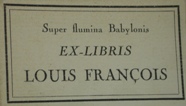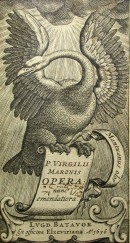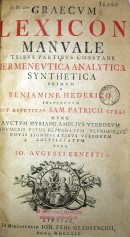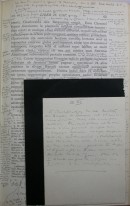Louis François
Louis François's father trained as a history teacher and made a career in secondary school administration: as a principal in Nice, Besançon and Caen, then a vice-principal at the Lycée Michelet and finally at the Lycée Henri IV in Paris. Louis sat his baccalaureate in Caen, prepared for the entrance examination to the Ecole Normale Supérieure at the Lycée Michelet (Paris) and was admitted to the ENS in 1893. Graduating with a double major in grammar and classics he started his teaching career at the age of 21 in Laval and Chartres, where he began a PhD in literature on Dio Chrysostom. Exempt from military service for health reasons, he spent the First World War at the Collège Rollin. After defending his thesis in 1922 he taught at the Lycée Louis-le-Grand then the Lycée Henri IV where he ended his career. Unable to move about easily, he devoted his time to teaching and built up a substantial working library, adding books to the very end of his life. He also collected medals and prints and practised bookbinding and framing. He did not have time to carry through the project to publish classical texts which he had planned for his retirement. It would have benefited from the upsurge in interest in classics following the launch of the Collection des Universités in 1920 under the patronage of the Association Guillaume Budé.
Louis François' wife and daughter offered the Mazarine his working library at the beginning of 1938. After visiting their home (95 bd Saint-Michel) at the end of February, Jean Lallier, administrator of the library, officially accepted the gift in early March. The donors wished the collection to be kept together, made available to the public, but not to be borrowed outside the library. The shelves were to be marked "Gift of Louis François (1875-1935). Grammar and arts graduate of the ENS. PhD. Knight of the Legion of honour." Although they were divided by formats in accordance with the Library's classification system, the books entered in the inventory in several lots between September 1938 and September 1939 are still together today. They follow the thematic classification used by Louis Francois. They bear the red stamp "Ex libris Louis François, Suorum liberalitate."
This collection of about a thousand titles is a remarkable example of the working library of a classics teacher in the early twentieth century. It comprises a large number of:
- Language reference books: dictionaries, glossaries, grammar books
- Manuals of ancient civilisation and literature
- Works on ancient art history and archaeology
- Editions of texts for teaching purposes: the German collection Bibliotheca scriptorum graecorum et romanorum Teubneriana, the first volumes of the Budé collection, etc.
- Old editions of classical texts (16th-18th centuries)
- The great humanist writers (Erasmus, Montaigne, etc.), the philosophers and major French and Spanish authors from the 17th-18th centuries (Pascal, La Bruyère, Cervantès, etc.), and a significant part of contemporary French literature (Hugo, Stendhal, Sainte-Beuve...).
Louis François took great care of his books and seldom annotated them. When he did so, it was to prepare Greek or Latin translation classes. Some volumes have a sign of ownership, a handwritten signature or, sometimes, a bookplate pasted on the inside front cover bearing the words "Super flumina Babylonis."
Shelfmark: 8° 67781-17
Shelfmark: 8° 88158
Shelfmark: 8° 109463
Bookplate of Dr Paul Lecène : "Gerasko d'aiei polla didaskomenos". In-8°
The lining paper is autographed by the author for the father of Louis François : "A Monsieur François, censeur du lycée Henri IV, hommage respectueux et dévoué, Max Egger". Max Egger (1861-1919) was a litterature teacher in the lycée Henri IV.
In the collection of Louis François there is several books inherited from his father. In-8°







